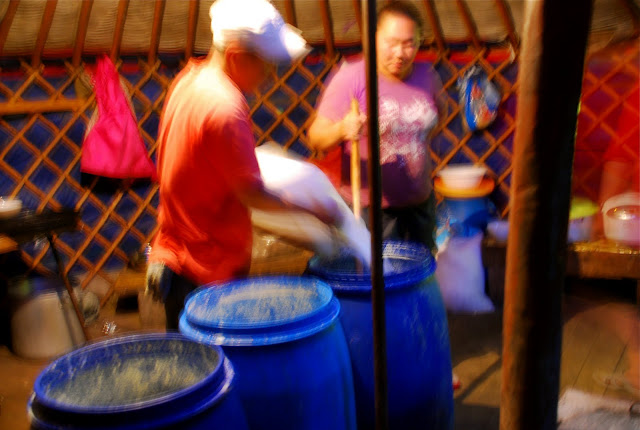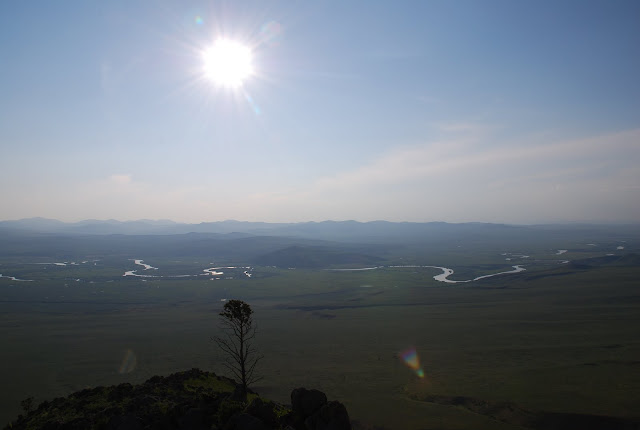There aren’t many nomadic cultures left in the world, and I guess that’s a major draw for Mongolia. It was for me. The minimalist lifestyle of an itinerant people is a romantic concept for kids like me, refugees of consumerism who think that going a couple weeks without running water will wash us clean of our capitalist disposition. So I would be sad if nomadism was phased out in Mongolia, not because I have a clear understanding of what that change would mean for the country and its herders, but because I love the idea of it.
There’s a lot of talk around here about where the nomadic lifestyle is headed, and opinions differ. Some people say that the system is no longer sustainable. They talk about a natural progression from pastoralism to agriculture. Others point out that simply replacing one system with another seemingly more efficient one is unjustifiable because pastoralism already serves multiple purposes in its social and ecological contexts. If one person says that herders, as low-intensity producers migrating from pasture to pasture, are protectors of the environment, then the next person will claim that herders, as a result of not being sedentary, have no respect for the land or their lasting effects on it. There is lots of talk. However, there are a few things that, as far as I can tell, are probably true.
Nomadic society is not the unsophisticated predecessor to sedentary agriculture. Historically, the economics and politics of mobile pastoral systems in Mongolia have been stratified and complex. The constraints of mobile pastoralism do not limit political organization or social complexity.
Herders do not wander in search of food and water. They undergo defined periodic migrations to known pastures in the appropriate season. Some only travel a couple of kilometers, for example, to benefit from a windy area during mosquito season or to be sheltered by a steep foothill in the winter. Others cover much larger distances.
Nomadism is not a timeless traditional society just now beginning to feel the winds of change. Neither was Soviet-influenced collectivization in 1929 its first transformation. Migrations have been changing with politics, religion, and leadership in the region since pretty much forever.
With no clear ideas about where herding is headed in the 21st century, I like listening to people talk about it. Livestock production interests me— go figure.
We spent a few days a day's train ride North of UB on a ranch, participating in one case-in-point. The place is run by a sixty-year-old German/ Russian-Kazakh man with an Australian accent. His name is Martin. He’s a mean old bastard, but the type that garners love and dependence from his family and employees. He has an education on him: an ex-miner, carpenter, soldier for the German army and the French Foreign Legion, a lawyer, and now a rancher with a tough Mongolian wife thirty years his junior. When he finds a viper in his garden, he throws it live into his neighbour’s yard.
In six years he's transformed his land into an impressive and ongoing accomplishment. They seeded pasture by hand, stampeding the animals up and down the acres to press the kernels deeper into the soil. They built a silage pit, a dairy barn, a green house, and a pizza oven. They cut hay with scythes. They planted deciduous trees now shading the property. There’s no farmhouse; the family and employees live in gers. They turned one ger into a smoke house. The only plumbing is used to water the garden and heat the dairy barn in winter.
Martin talks a lot about overcoming Mongolian traditional approaches to food production. At every turn, Martin boasts, the family told him that what he was doing would not work in Mongolia. And when his methods succeeded, there was all the same a lingering reluctance to continue them.
However, Martin and his family have not rejected the nomadic system out of hand. While we were there, preparations were being made to move the animals to their cultivated summer pasture, three kilometers away. A couple of gers, and three new employees would go with them. I asked Martin if it wasn’t easier to have someone herd the cattle that distance for the milking in the evening/morning, rather than move the gers, fences and supplies. But this way, the cattle are back out on pasture immediately after milking. The saved time the animals spend grazing and not walking contributes noticeably to the weight they put on over the summer. So even Mongolia’s model ranch still moves gers to summer pastures with the livestock.
In a country with the world’s second highest prevalence of brucellosis, Martin’s herd is brucellosis-free. They test the herd every three months, and Martin explained how forcing the local veterinarian to use separate needles for each cow almost came to blows and a divorce. He claims he is forced to throw the used needles in a pit and cover them with cement to prevent the family from rinsing and reselling them. The government provides needles to veterinarians for brucellosis testing, and his vet sells these on the black market.
I thought that Martin’s frustrations were fairly typical of any aged, intelligent, and hardworking person, although Martin thinks differently.
“Mongolian people are the stupidest you’ll ever meet,” he explained on several occasions. “There’s just nothing up there.”
To me, this estimation typifies a familiar ex-pat tendency to characterize human behavior in their host country as something unique to that region, and to credit a particular history, culture, nationality, or “race”, with its inception.
Speaking to one senior American diplomat at a party, I was informed that Mongolians don’t value their environment, leaving garbage and debris wherever they’ve been. “This is the communist hangover,” said the old diplomat. “If it’s not mine, its nobody’s.”
I thought about that for a moment. “Well I spent the last four summers living in bush-camps with Canadians,” I began, “and the only reason anything was ever picked up behind us was because the company forced it, and that was only to avoid government fines. The camps became disorganized trash heaps in a matter of weeks. We dug pit latrines, but planters preferred to defecate in the woods around their tents, even if their tents were close to the river from which we pumped our water. And these were all university-educated young adults from a country that’s been capitalist and democratic since its confederation. I don’t doubt you’re correct in saying that a communist history still influences the present, but it’s also true that people commonly behave this way elsewhere.” The old diplomat gave me a strange look. I think he was contemplating my impertinence, and not my opinion.
I hold no convictions about the future of herding, the merits of pastoralism, or the efficiency of farming. My opinion at this point is that people are sometimes too loose with their logic, when it comes to ideas about cause and effect.
 | ||
| Reining in a Mongolian pony for a picture. Dayle doesn't enjoy the "out-of-control" feeling, so I am forced to behave myself. |
 |
| upgrading the party bucket |
 |
| Anak Ranch |
 |
| Milking. The ranch has a milking machine, but the employees don't like to use it. |
 |
| Making better yogurt than you can imagine |
 |
| Making fermented cow's milk (Tairag). They then distil the alcohol from the Tairag and make moonshine. |
 |
| Dried manure stored for winter burning in the gers. The other side of the barn is packed with coal. |
 |
| The wood shop where they make pine boxes to sell to the mining company. The boxes are used for shipping mineral samples back to Canada. |
 |
| Climbing hills again |
 |
| Slicing cheese curd for drying on the roof |
 |
| delicious fresh milk |
 |
| watching TV in the ger |
 |
| cheese curd drying in the Sun |
 |
| soft tendons |
 |
| banding calves |






No comments:
Post a Comment